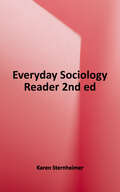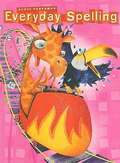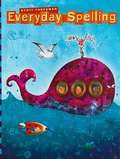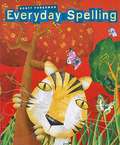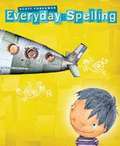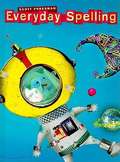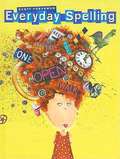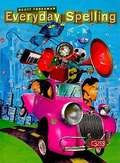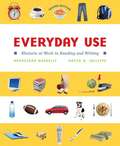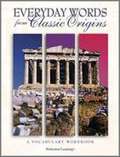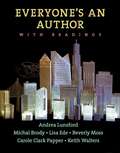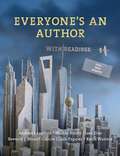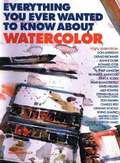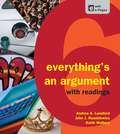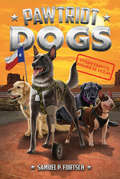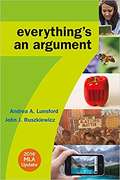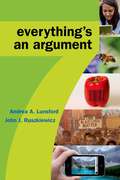- Table View
- List View
Everyday Mathematics®: Resources for the Kindergarten Classroom, Kindergarten
by The University of Chicago School Mathematics Project Ann E. Audrain Margaret KruleeNIMAC-sourced textbook
Everyday Sociology Reader
by Karen SternheimerThis book combines classic and contemporary readings by sociologists with posts from the Everyday Sociology blog to help students make connections between major sociological concepts, popular culture, current events, and everyday life. A wealth of suggested activities, exercises, discussion questions, and essay topics gets students actively engaging in sociological thinking, writing, and research.
Everyday Spelling (D' Nealian Edition)
by James Beers W. Dorsey Hammond Ronald L CramerThis book contains a lot of useful resources to learn and practice spelling on English Language.
Everyday Spelling (Grade #5)
by James Beers W. Dorsey Hammond Ronald L CramerYou can conquer long words by dividing them into short parts.
Everyday Spelling (Grade #7)
by James Beers Ronald L. Cramer W. Dorsey HammondThe book helps in improving spelling skills by developing spelling consciousness, improving pronunciation for spelling and creating memory tricks.
Everyday Spelling D'Nealian Edition
by James Beers Ronald L. Cramer W. Dorsey HammondNIMAC-sourced textbook
Everyday Spelling [Grade 8]
by James Beers Ronald L. Cramer W. Dorsey HammondReading can be a grand adventure But children need a road map along the way. Phonics helps them understand the relationship between letters and sounds, paving the way to their becoming successful readers and writers. Join your middle school student in this adventure with Pearson phonics and spelling products.
Everyday Use: Rhetoric at Work in Reading and Writing (2nd Edition)
by David A. Jolliffe Hephzibah RoskellyBrief and accessible, this rhetoric teaches students to read closely, critically, and rhetorically, and to write effectively to achieve their rhetorical goals. Everyday Use answers the basic question, "What is rhetoric?" It shows rhetoric as set of activities-reading, writing, speaking, listening-that all intellectually engaged people participate in every day. And it shows that a knowledge of rhetoric is essential in understanding how written and spoken texts influence thought and action every day, in private and in public forums, for good or ill. By demystifying rhetoric and rescuing it from common public misconceptions,Everyday Use equips students to be effective communicators in the academic world and in everyday life.
Everyday Use: Rhetoric at Work in Reading and Writing (AP Edition)
by David A. Jolliffe Hephzibah RoskellyEveryday Use: Rhetoric at Work in Reading and Writing is designed specifically for use in Advanced Placement English courses that try to achieve these goals. In six chapters and a series of interchapters, this book provides a foundation for reading insightfully and writing effectively and strives to teach students how to produce their own texts that are rich, purposeful, and effectively crafted.
Everyday Words from Classic Origins
by PLC Editors Staff Perfection LrnThe Greeks had a word for it. And so did the Romans. The Greek and Roman civilization have left us a rich legacy of language which remains embedded in every day speaking and writing. As a result, you can increase your vocabulary very easily without the agonizing memorization of word lists.
Everyone's An Author (With Readings)
by Lisa Ede Andrea A. Lunsford Keith Walters Beverly J. Moss Michal Brody Carole Clark PapperEveryone's an Author focuses on writing as it really is today--with words, images, and sounds, in print and online--and encourages students to see the connections between their everyday writing and academic writing. It covers the genres college students need to learn to write--and teaches them to do so across media. It bridges the gap between Facebook and academic writing, showing how the strategies students use instinctively in social media can inform their academic writing. And it provides a strong rhetorical framework that guides students in the decisions they need to make as authors today. The version with readings includes an anthology of 35 readings.
Everyone's An Author: With Readings
by Lisa Ede Keith Walters Michal Brody Carole Clark Papper Andrea Lunsford Beverly MossBuilt on the keystones of rhetoric, Everyone’s an Author provides a strong foundation for authoring in the digital age: in college essays, but also on Twitter; in print, but also online; with words, but also with sound, video, and images. It shows students that the rhetorical skills they already use in social media, in their home and religious communities, at work and in other nonacademic contexts are the same ones they’ll need to succeed in college. Examples and readings drawn from across multiple media and dealing with topics that matter to students today make this a book that everyone who takes first-year writing will relate to.
Everything Money: A Wealth of Facts, Photos, and Fun!
by Kathy Furgang Fred HiebertNIMAC-sourced textbook
Everything You Ever Wanted to Know about Watercolor
by Marian AppellofImagine an art school where more than 15 popular watercolorists teach, and you've imagined Everything You Ever Wanted to Know About Watercolor, a full-to-the-brim 400-page anthology of Watson-Guptill's finest watercolor instruction from recent best-selling authors. This treasure trove reviews the tools and materials of watercolor, then proceeds with the color palette, color mixing, and applied color theory. The full range of painting techniques is presented--the fundamentals of brushwork, laying in a simple wash, working wet-in-wet, drybrushing, masking, pouring, scratching, glazing, and more--as well as techniques for achieving various textures like tree bark and grass.
Everything's An Argument With Readings 6th Edition
by Andrea A. Lunsford John J. Ruszkiewicz Keith WaltersThis best-selling combination argument text and thematically organized reader shows students how to analyze all kinds of arguments -- not just essays and editorials, but clothes, smartphone apps, ads, and Web site designs -- and then how to use what they learn to write their own effective arguments. Newly streamlined, its signature engaging, and jargon-free instruction emphasizes cultural currency, humor, and visual argument. Students loveEverything's an Argumentbecause it helps them understand how a world of argument already surrounds them; instructors love it because it helps students construct their own personally meaningful arguments about that world. The print text is now integrated with e-Pages forEverything's an Argument, designed to take advantage of what the Web can do. Also available in a brief version without the reader and as an e-Book.
Everything's Bigger in Texas #2 (Pawtriot Dogs #2)
by Samuel P. FortschJoin former U.S. Army rescue dog Sgt. "Rico" Ricochet, a bomb-sniffing Malinois, as he gears up for his second mission with the Pawtriots in this all-American illustrated chapter book series!The Pawtriots are on a larger-than-life mission down in Texas to rescue a litter of kidnapped puppies...But who can they trust on the mighty Rio Grande?For young readers wanting action-packed adventure with a patriotic message, the Pawtriots are the perfect team!
Everything's an Argument (7th Edition)
by Andrea A. Lunsford John J. RuszkiewiczTHIS TITLE HAS BEEN UPDATED TO REFLECT THE 2016 MLA UPDATES! Our editorial team has updated this text based on content from The MLA Handbook, 8th Edition. Browse our catalog or contact your representative for a full listing of updated titles and packages, or to request a custom ISBN. Everything's an Argument teaches students to analyze the arguments that surround them every day and to create their own. This best-selling text offers proven instructional content by composition luminaries Andrea Lunsford and John Ruszkiewicz, covering five core types of arguments. Revised based on feedback from its large and devoted community of users, the seventh edition offers a new chapter on multimedia argument and dozens of current arguments across perspectives and genres, from academic essays and newspaper editorials to tweets and infographics. Combine the text with LaunchPad for Everything's an Argument with Readings for even more engaging content and new ways to get the most out of your course. Access unique, book-specific materials in a fully customizable online course space; then adapt, assign, and integrate our resources with yours. This LaunchPad includes: Interactive exercises and tutorials for reading, writing, and research LearningCurve adaptive, game-like practice that helps students focus on the topics where they need the most help, such as fallacies, claims, evidence, and other key elements of argument Reading comprehension quizzes Also available in a full version with 35 additional readings.
Everything's an Argument (7th Edition)
by Andrea A. Lunsford John J. RuszkiewiczEverything's an Argument teaches students to analyze the arguments that surround them every day and to create their own. This best-selling text offers proven instructional content by composition luminaries Andrea Lunsford and John Ruszkiewicz, covering five core types of arguments. Revised based on feedback from its large and devoted community of users, the seventh edition offers a new chapter on multimedia argument and dozens of current arguments across perspectives and genres, from academic essays and newspaper editorials to tweets and infographics. Combine the text with LaunchPad for Everything's an Argument with Readings for even more engaging content and new ways to get the most out of your course. Access unique, book-specific materials in a fully customizable online course space; then adapt, assign, and integrate our resources with yours. This LaunchPad includes: Interactive exercises and tutorials for reading, writing, and research LearningCurve adaptive, game-like practice that helps students focus on the topics where they need the most help, such as fallacies, claims, evidence, and other key elements of argument Reading comprehension quizzes Also available in a full version with 35 additional readings.

